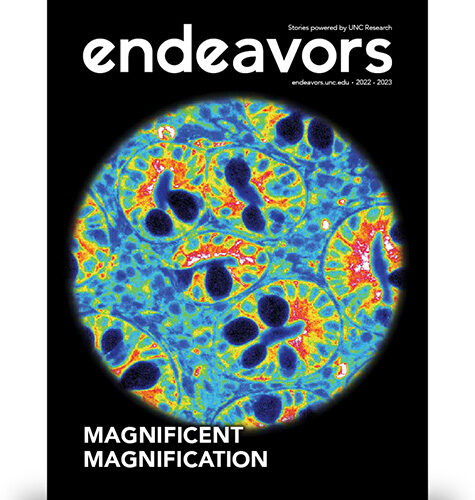2022-2023 Endeavors Magazine
A professor who specializes in psychoneuroimmunology: a mouthful that means she studies how psychological stress impacts the brain and the body. A marimba player who uses music to connect to and communicate with others. A virologist developing a new technique for treating infections that could help us quickly respond to future pandemics.
The fourth annual print edition of Endeavors showcases a variety of research projects and researchers who are leaving a lasting impact on our state and beyond. It celebrates the creative, transformational spirit of research at Carolina — and how collaborative, diverse teams are tackling some of the world’s greatest challenges.
Stories in this Edition
Slowly, Then All at Once
Shekinah Elmore’s road to radiation oncology was long, exhausting, and unexpected.
Infusing Hope for Hemophilia
A gene therapy clinical trial for hemophilia shows promise and could be approved by the FDA later this year — a feat made possible, in part, by UNC-Chapel Hill’s 70-year-old research program
Microscope Magic
Since middle school, Michelle Itano has been mesmerized by the power of microscopes. These seemingly familiar pieces of technology can do so much more than simply capture images of small things. They can unveil a world beyond our imagination — one Itano strives to show as many people as possible.
Opening Doors Through Data
The UNC School of Data Science and Society is slated to open in Fall 2022. Jay Aikat, RENCI’s chief operating officer, discusses its origins and why data science is so vital in today’s world.
Magnificent Magnification
Researchers across UNC-Chapel Hill are using advanced imaging technologies and techniques to improve our understanding of cellular processes — with visually stunning results. Collected from a variety of labs, these images showcase the incredible projects our researchers are working on and the beauty of the human body in all its forms.
Where Words Fail Music Speaks
For most of his life, Juan Álamo has used music to connect to and communicate with others. As a skilled marimba player, he uses his talent and passion to teach the next generation of musicians to do the same.
On Being Human
For decades, philosophers have pointed to reason as the trait that differentiates humans from other beings. Now, as many scholars identify what makes humans similar to other creatures, philosophy professor Susan Wolf strives to discover other attributes that make us unique.
Cell by Cell
Since he was in high school, Craig Cameron has been interested in viruses and vaccines. Now, he and a team of microbiologists and immunologists are studying viral infection on a single-cell level to help create better medicines.
Disassembling Evolution’s Engine
When a research project centered on evolution within spadefoot toads fell through, Emily Harmon shifted her focus to microscopic swimmers called rotifers. The biology PhD student is studying an animal’s ability to adapt in one generation, which could inform conservation efforts in the face of climate change.
Sikoya Ashburn
Sikoya Ashburn is a postdoctoral researcher in the Department of Psychology and Neuroscience within the UNC College of Arts & Sciences. She uses neuroimaging to understand how the cerebellum affects higher cognitive functions and neurodevelopmental disorders, like ADHD, in children.
Setting the Art World Ablaze
Upon discovering a series of political cartoons mocking artists in 18th– and 19th-century France in 2010, UNC-Chapel Hill art historian Kathryn Desplanque couldn’t stop searching for them. Now, she has amassed more than 500 and is using them to redefine how we think about art and the artist in modern-day society.
Finding Her Field
UNC–Chapel Hill prides itself on the abundance of opportunities available to undergraduate researchers. Even so, it can be daunting for students to make that first step into hands-on research. Autumn Tucker, a senior majoring in neuroscience, talks about working in the Leon Coleman Lab and how that has shaped her education and growth as a researcher.

